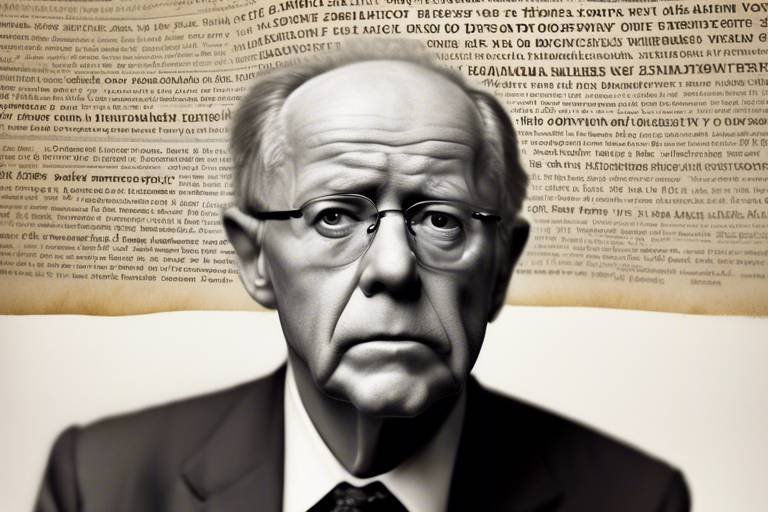Roles and Responsibilities - The Politics of Philosophy
This article explores the intricate relationship between roles and responsibilities within the realm of philosophy, examining how political ideologies shape our understanding of ethical duties and societal obligations.
Philosophical roles often encompass various dimensions, including the responsibilities of philosophers in society, educators, and thinkers, and how these roles influence public discourse and ethical considerations. Philosophers are not merely abstract thinkers locked away in ivory towers; they are active participants in the world around them. They engage with pressing issues, offering insights that can lead to societal transformation. Their roles can range from being educators who shape young minds to being public intellectuals who challenge the status quo. This dynamic interaction highlights the importance of philosophy in addressing real-world problems and fostering a more just society.
The intersection of ethics and political philosophy raises critical questions about moral responsibilities, justice, and the role of individuals in shaping political landscapes through philosophical thought. For instance, consider how different ethical frameworks—such as utilitarianism or deontology—can lead to varying conclusions about what our responsibilities are toward others. The decisions we make can ripple through society, affecting countless lives. This is where the philosopher's role becomes crucial: to dissect these ethical dilemmas and provide clarity. By engaging with these ideas, individuals can better understand their roles in society and the ethical implications of their actions.
Exploring historical perspectives on responsibility provides insight into how philosophical thought has evolved, influencing contemporary views on ethical obligations and civic duties across different cultures and eras. From ancient Greece to modern times, the concept of responsibility has undergone significant transformation. Ancient philosophers like Plato and Aristotle laid the groundwork for understanding roles and responsibilities, emphasizing the importance of virtue and moral character in political life and societal structures. Their ideas continue to resonate today, reminding us that our responsibilities are not just to ourselves but to the community at large.
Ancient philosophers like Plato and Aristotle laid the groundwork for understanding roles and responsibilities, emphasizing the importance of virtue and moral character in political life and societal structures. For instance, Plato's notion of the "Philosopher King" suggests that those who govern should possess wisdom and virtue, thus intertwining ethical responsibility with political authority. Aristotle, on the other hand, focused on the concept of *eudaimonia*—the idea of living a flourishing life—arguing that fulfilling one's roles in society is essential for achieving true happiness. These foundational ideas continue to shape our understanding of ethical duties today.
Modern philosophers, such as Kant and Mill, expanded the discourse on social responsibility, advocating for the moral obligations individuals hold toward their communities and the broader society. Kant's categorical imperative urges us to act in ways that could be universalized, prompting individuals to consider the impact of their actions on others. Mill’s utilitarianism, on the other hand, encourages a focus on the greatest good for the greatest number, pushing us to evaluate our responsibilities in terms of outcomes. These philosophical frameworks compel us to reflect on our roles in society and how we can contribute positively to the collective well-being.
Contemporary philosophical debates address pressing issues, such as environmental ethics and global justice, challenging individuals to reconsider their responsibilities in light of current global challenges and societal needs. As we face crises like climate change and social inequality, the role of philosophy becomes even more critical. It urges us to think deeply about our ethical obligations not just to our immediate communities but to future generations and the planet. Philosophers today are tasked with navigating these complex issues, providing insights that can guide individuals and societies toward more responsible actions.
Education plays a pivotal role in shaping philosophical thought and understanding responsibilities, fostering critical thinking and ethical reasoning among students and future leaders in society. By integrating philosophy into educational curricula, we equip students with the tools to analyze ethical dilemmas and engage in meaningful political discourse. This educational foundation is essential for cultivating responsible citizens who can navigate the complexities of modern life.
Incorporating philosophy into educational curricula equips students with the tools to navigate complex ethical dilemmas, enhancing their ability to engage in meaningful political discourse and social responsibility. Imagine a classroom where students debate moral questions, explore different philosophical perspectives, and develop their own ethical frameworks. This kind of education not only sharpens critical thinking skills but also instills a sense of responsibility toward others and the world. It prepares students to become informed citizens who can contribute positively to society.
Philosophical engagement encourages activism, inspiring individuals to take on roles that challenge injustices and advocate for ethical practices within their communities and beyond. When philosophy meets action, powerful movements can emerge. Think about how philosophical ideas have fueled social justice movements throughout history. By understanding their ethical responsibilities, individuals can become catalysts for change, pushing for reforms that align with their philosophical beliefs. This engagement is vital in creating a society that values justice, equality, and moral integrity.
- What are the main roles of philosophers in society? Philosophers serve as educators, public intellectuals, and ethical guides, helping society navigate complex moral dilemmas.
- How does philosophy influence political thought? Philosophy provides frameworks for understanding justice, responsibility, and the ethical implications of political actions.
- Why is education important in philosophy? Education fosters critical thinking and ethical reasoning, equipping individuals to engage with societal issues responsibly.
- What contemporary issues do philosophers address today? Philosophers tackle issues like environmental ethics, social justice, and global responsibility, urging individuals to reconsider their roles in these contexts.

The Nature of Philosophical Roles
Philosophy is not just an abstract discipline confined to dusty books and lofty ideas; it is a vibrant field that plays an essential role in shaping our understanding of the world and our place within it. Philosophers wear many hats, each representing a unique set of responsibilities that influence society, education, and culture. Whether they are educators, public intellectuals, or activists, the roles philosophers assume carry significant weight in the discourse surrounding ethics, justice, and societal obligations.
At its core, the role of a philosopher is to engage deeply with the fundamental questions of existence, morality, and knowledge. This engagement often leads to a responsibility to communicate these ideas effectively to the public. Philosophers must not only ponder abstract concepts but also translate these ideas into practical frameworks that can guide individuals and communities in their decision-making processes. This is where the intersection of philosophy and politics becomes particularly intriguing, as political ideologies often dictate the ethical duties we owe to one another.
For instance, consider the role of the philosopher as an educator. In this capacity, they are tasked with fostering critical thinking and ethical reasoning among students. By cultivating an environment where questioning is encouraged, philosophers help students navigate the complex moral landscapes they will encounter in their lives. This educational role is crucial because it lays the groundwork for future leaders who will be tasked with making ethical decisions that affect society at large.
Moreover, philosophers often find themselves in the role of public intellectuals, engaging with societal issues through lectures, writings, and media appearances. In this capacity, they have a responsibility to inform and challenge public opinion, particularly on matters of justice and ethical conduct. Their insights can spark crucial conversations about pressing issues such as inequality, climate change, and human rights. This role is vital in a world where misinformation can spread rapidly, making the philosopher's voice a beacon of reason and clarity.
In addition to these roles, philosophers also engage in activism, which can be seen as an extension of their philosophical duties. When philosophers advocate for social change, they embody the principle that ideas must translate into action. This activism can take many forms, from grassroots movements to policy advocacy, all aimed at addressing injustices and promoting ethical practices within society. The philosopher's role in activism emphasizes the importance of not just understanding our ethical responsibilities but also acting upon them.
Ultimately, the nature of philosophical roles is multifaceted and dynamic. Philosophers are not just thinkers; they are doers, educators, and advocates. Their responsibilities extend beyond the classroom or the lecture hall, influencing public discourse and shaping societal norms. As we navigate the complexities of modern life, the contributions of philosophers become increasingly vital in guiding us toward a more just and ethical society.

Ethics and Political Philosophy
When we dive into the world of ethics and political philosophy, we're essentially peeling back the layers of our own moral compass. What does it mean to be responsible in a society that constantly evolves? The intersection of these two fields invites us to question not only our individual ethical duties but also how our political beliefs shape our understanding of justice and responsibility. Imagine ethics as the foundation of a house, while political philosophy serves as the walls that hold everything up. Without a solid foundation, the structure can crumble, leaving us with a disjointed view of our obligations.
At the heart of this discussion lies a pressing question: How do our beliefs about morality influence our political actions? The answer is multifaceted, as it involves a complex interplay of personal values, societal norms, and historical context. For instance, consider how different political ideologies—be it liberalism, conservatism, or socialism—frame the concept of responsibility. Each ideology presents a unique perspective on what ethical duties individuals owe to their communities and the state. This divergence can lead to heated debates about the role of government, the extent of individual freedoms, and the nature of justice.
Furthermore, the relationship between ethics and political philosophy is not just theoretical; it has real-world implications. For example, when we discuss issues like climate change or social justice, our ethical stances guide our political actions. Do we see ourselves as stewards of the planet with a moral obligation to protect it? Or do we prioritize economic growth over environmental sustainability? These questions compel us to reflect on our responsibilities as citizens and the ethical frameworks that guide our decisions.
To illustrate this point further, let's consider a few key ethical theories and their political implications:
| Ethical Theory | Political Implication |
|---|---|
| Utilitarianism | Policies should aim for the greatest good for the greatest number, often justifying sacrifices for the collective. |
| Deontology | Emphasizes duties and rules, advocating for individual rights regardless of the consequences. |
| Virtue Ethics | Focuses on moral character, suggesting that a just society is built upon virtuous individuals. |
As we can see, the ethical frameworks we adopt can significantly influence our political beliefs and actions. This dynamic relationship prompts us to engage in deeper conversations about our roles within society. Are we merely passive observers, or do we actively participate in shaping our political landscape based on our ethical convictions? The answer to this question lies in our willingness to engage with both philosophical thought and practical activism.
In conclusion, the connection between ethics and political philosophy is a rich tapestry woven from our beliefs, actions, and societal structures. As we navigate the complexities of modern life, it's crucial to remain aware of how our ethical responsibilities shape our political ideologies and, ultimately, our world. By fostering a deeper understanding of this relationship, we can better equip ourselves to face the challenges that lie ahead.
- What is the main focus of ethics in political philosophy? Ethics in political philosophy primarily examines the moral principles that govern individuals' actions within society and how these principles influence political structures.
- How do different political ideologies interpret ethical responsibilities? Different political ideologies, such as liberalism and conservatism, offer varying interpretations of ethical responsibilities, particularly concerning individual rights and communal obligations.
- Why is it important to understand the relationship between ethics and politics? Understanding this relationship helps individuals navigate complex societal issues and encourages active participation in political discourse and ethical decision-making.

Historical Perspectives on Responsibility
When we delve into the , we uncover a rich tapestry woven with the threads of philosophical thought across various eras and cultures. Each philosophical tradition has contributed uniquely to our understanding of what it means to be responsible, both as individuals and as members of society. For instance, in ancient Greece, philosophers like Plato and Aristotle were pivotal in shaping the discourse around moral and civic responsibilities. They posited that a virtuous life is not just about personal ethics but also about contributing to the greater good of society.
Plato, through his work "The Republic," emphasized the idea of the "philosopher-king," suggesting that those who understand the essence of justice and virtue have a responsibility to govern wisely. This notion implies that with knowledge comes a profound duty to act in the interest of the community. Similarly, Aristotle introduced the concept of eudaimonia, or human flourishing, which he argued could only be achieved through virtuous actions that benefit oneself and others. This intertwining of personal and social responsibility continues to resonate in modern ethical discussions.
As we journey through history, we encounter the Enlightenment, a period that brought forth thinkers like Immanuel Kant and John Stuart Mill. Kant's deontological ethics revolved around the idea of duty and moral law, asserting that individuals have a responsibility to act according to principles that could be universally applied. This framework laid the groundwork for modern human rights discourse, emphasizing that every individual holds responsibilities toward others simply by virtue of their humanity.
On the other hand, Mill's utilitarianism introduced a consequentialist approach, arguing that the rightness of actions is determined by their outcomes. This perspective challenges us to consider our responsibilities in light of the broader implications of our actions, urging us to strive for the greatest happiness for the greatest number. Such debates have paved the way for contemporary discussions about social justice and ethical obligations in a globalized world.
Furthermore, the evolution of thought around responsibility can be seen in various cultural contexts. For example, in Eastern philosophies, the concept of dharma in Hinduism and Buddhism emphasizes a duty to act in accordance with one's role in society, highlighting the interconnectedness of all beings. This perspective enriches our understanding of responsibility by framing it as a communal rather than solely individual obligation.
As we reflect on these historical perspectives, it becomes evident that our current understanding of responsibility is deeply rooted in these philosophical traditions. They challenge us to think critically about our roles in society and the ethical implications of our actions. In a world facing complex challenges such as climate change, inequality, and social injustice, revisiting these foundational ideas can inspire us to take action and fulfill our responsibilities to one another and the planet.
| Philosopher | Key Concept | Impact on Responsibility |
|---|---|---|
| Plato | Philosopher-King | Governance and virtue |
| Aristotle | Eudaimonia | Personal and social flourishing |
| Kant | Deontological Ethics | Universal moral duties |
| Mill | Utilitarianism | Consequences for the greater good |
In conclusion, the historical perspectives on responsibility not only enrich our philosophical discourse but also provide a framework for understanding our ethical duties in today's world. By examining these ideas, we can better appreciate the intricate relationship between our actions and their impact on society.
- What is the significance of historical perspectives in understanding responsibility?
Historical perspectives provide context and depth to our current understanding of responsibility, highlighting how philosophical ideas have evolved over time. - How do ancient philosophies influence modern ethical discussions?
Ancient philosophies laid the groundwork for contemporary ethical frameworks, emphasizing the importance of virtue, duty, and the role of individuals in society. - What role does education play in shaping our understanding of responsibility?
Education fosters critical thinking and ethical reasoning, equipping individuals to navigate complex moral dilemmas and engage in responsible citizenship.

Ancient Philosophers and Their Influence
When we delve into the realm of ancient philosophy, we uncover a treasure trove of ideas that have shaped our understanding of roles and responsibilities in society. Think about it: the very foundations of Western thought were laid by brilliant minds like Plato and Aristotle. These philosophers didn't just ponder abstract concepts; they actively engaged with the world around them, crafting theories that resonate even today. Plato, for instance, introduced the concept of the ideal state, where he believed that philosopher-kings should lead society. This idea underscores the responsibility of those in power to be virtuous and knowledgeable, highlighting the ethical duty of leaders to act in the best interests of their citizens.
Aristotle, on the other hand, took a more pragmatic approach. He emphasized the importance of virtue ethics, arguing that moral character is crucial for fulfilling one’s role in society. According to Aristotle, our responsibilities are intertwined with our pursuit of eudaimonia—a state of flourishing achieved through virtuous living. This perspective invites us to reflect on how our actions contribute to the greater good, urging us to consider not just what we do, but why we do it. In essence, Aristotle's teachings encourage us to cultivate our virtues to fulfill our societal roles effectively.
Moreover, the influence of ancient philosophers extends beyond individual ethics; it permeates the very fabric of political structures. The dialogues of Plato, particularly in works like The Republic, challenge us to think critically about justice and the role of citizens in governance. Plato's allegory of the cave serves as a powerful metaphor for enlightenment and the responsibilities that come with knowledge. When individuals awaken to truth, they bear the obligation to share that knowledge and guide others, fostering a more informed and ethical society.
In summary, the contributions of ancient philosophers are not merely historical footnotes; they provide a framework for understanding our roles and responsibilities today. Their ideas compel us to consider the ethical implications of our actions and the responsibilities we hold towards others. As we navigate the complexities of modern life, the insights from Plato and Aristotle serve as a reminder that our philosophical heritage is rich with lessons on how to lead virtuous lives and fulfill our obligations to society.
- What is the main idea behind Plato's philosophy?
Plato's philosophy emphasizes the importance of ideals and the role of philosopher-kings in achieving a just society.
- How did Aristotle view ethics?
Aristotle believed in virtue ethics, where moral character and the pursuit of eudaimonia are central to fulfilling one's responsibilities.
- Why are ancient philosophers still relevant today?
Their ideas challenge us to reflect on our roles and responsibilities in society, providing timeless insights into ethics and governance.

Modern Philosophers and Social Responsibility
In the realm of modern philosophy, the concept of social responsibility has taken center stage, as thinkers like Immanuel Kant and John Stuart Mill have profoundly influenced our understanding of ethical obligations towards society. These philosophers have not only shaped the academic discourse but have also provided frameworks that encourage individuals to recognize their roles as active participants in the moral fabric of their communities.
Kant, known for his deontological ethics, emphasized that our actions must adhere to universal moral laws. He believed that individuals have a duty to act in ways that could be universally applied. This principle of the Categorical Imperative encourages people to consider the implications of their actions on a broader scale. For instance, when making decisions, one should ask: "Would it be acceptable if everyone acted this way?" This line of thinking fosters a sense of responsibility that extends beyond personal interests to encompass the well-being of others.
On the other hand, Mill's utilitarianism presents a contrasting yet complementary perspective. He argued that the best action is the one that maximizes overall happiness or utility. This approach invites individuals to weigh the consequences of their actions, considering not just their immediate effects but also their impact on the greater good. By prioritizing collective welfare, Mill's philosophy urges us to take responsibility for our societal roles, advocating for actions that promote justice and equity.
Modern philosophers have also explored the implications of social responsibility in various contexts, including:
- Environmental Ethics: The growing awareness of climate change and environmental degradation has prompted philosophers to examine our obligations to the planet and future generations.
- Global Justice: As the world becomes increasingly interconnected, questions arise about our responsibilities to those in different socio-economic conditions, challenging us to advocate for equitable policies.
- Corporate Responsibility: The role of businesses in society has come under scrutiny, with philosophers arguing for ethical practices that prioritize social welfare over mere profit.
The discussions surrounding social responsibility in modern philosophy are not just academic; they inspire real-world action. Philosophers encourage individuals to engage in their communities, whether through activism, volunteering, or simply being informed citizens. By embracing these roles, we can contribute to a more just and equitable society.
In conclusion, the works of modern philosophers like Kant and Mill remind us that social responsibility is not merely a theoretical concept but a practical necessity. Their ideas challenge us to reflect on our actions and their consequences, urging us to take an active role in shaping a better world for all. As we navigate the complexities of modern life, let us take to heart the lessons of these thinkers and strive to uphold our ethical duties within our communities.
- What is social responsibility in philosophy? Social responsibility in philosophy refers to the ethical obligation individuals have to act for the benefit of society as a whole, considering the impact of their actions on others.
- How do Kant and Mill differ in their views on social responsibility? Kant emphasizes duty and universal moral laws, while Mill focuses on the consequences of actions and maximizing overall happiness.
- Why is social responsibility important today? In an increasingly interconnected world, social responsibility is crucial for addressing global challenges like climate change, inequality, and social justice.

Contemporary Issues in Philosophy
In today's rapidly changing world, contemporary philosophy grapples with a myriad of pressing issues that challenge our understanding of ethics, responsibility, and justice. As we navigate through the complexities of modern life, philosophers are not just observers; they are active participants in the discourse surrounding critical topics such as environmental ethics, global justice, and the implications of technology on our moral landscape. These debates compel us to rethink our roles and responsibilities not only as individuals but as members of a global community.
One of the most significant contemporary issues is the ethical consideration of our environment. With climate change looming as a dire threat, philosophers are urging us to reconsider our relationship with nature. Questions arise: Do we have a moral obligation to protect the environment for future generations? What responsibilities do corporations and governments hold in combating climate change? Philosophers like Peter Singer advocate for a utilitarian approach, suggesting that our actions should aim to maximize overall well-being, which includes the health of our planet.
Another critical area of focus is global justice. In an increasingly interconnected world, the disparities between the rich and the poor have become glaringly evident. Philosophers such as Amartya Sen and Martha Nussbaum have contributed significantly to this discourse, emphasizing the importance of capabilities and social justice. They argue that individuals should have the opportunity to lead fulfilling lives, which raises questions about the responsibilities of wealthier nations towards less fortunate ones. Should affluent countries assist in alleviating poverty and inequality? What ethical frameworks can guide international relations to promote justice?
Furthermore, the rise of technology presents a host of philosophical dilemmas. The advent of artificial intelligence and surveillance technologies has sparked debates about privacy, autonomy, and the potential for abuse of power. Philosophers are questioning whether technological advancements enhance or undermine our ethical responsibilities. For instance, as we increasingly rely on algorithms for decision-making, we must ask: Who is accountable when these systems fail? The implications of these questions extend far beyond academic discussions; they influence policy-making and everyday life.
To illustrate the interconnectedness of these contemporary issues, consider the following table summarizing key areas of concern in modern philosophy:
| Issue | Key Questions | Philosophers Involved |
|---|---|---|
| Environmental Ethics | What are our obligations to future generations? How do we balance economic growth with ecological sustainability? | Peter Singer, Aldo Leopold |
| Global Justice | What responsibilities do affluent nations have towards poorer countries? How can we ensure equitable distribution of resources? | Amartya Sen, Martha Nussbaum |
| Technology and Ethics | What ethical considerations arise from AI and surveillance? Who is accountable for technological failures? | Shoshana Zuboff, Nick Bostrom |
In conclusion, contemporary issues in philosophy are not merely theoretical musings; they are vital discussions that shape our understanding of our roles and responsibilities in society. As we confront challenges like environmental degradation, global inequality, and the ethical implications of technological advancements, it is imperative that we engage with these philosophical inquiries. By doing so, we not only enrich our own understanding but also contribute to a more just and responsible world.
- What is the role of philosophy in addressing contemporary issues?
Philosophy helps us critically analyze and understand the ethical implications of modern challenges, guiding our decisions and responsibilities. - How can philosophy influence public policy?
Philosophical ideas can shape the values and principles that underpin legislation, encouraging policies that promote justice and ethical responsibility. - Why is environmental ethics important?
Environmental ethics emphasizes our moral obligations to protect the planet, ensuring sustainability for future generations.

The Role of Education in Philosophy
Education is not just about acquiring knowledge; it's about shaping minds and molding future leaders. In the realm of philosophy, education plays a pivotal role in fostering critical thinking and ethical reasoning. Imagine a world where every individual possesses the ability to question norms, challenge injustices, and engage in meaningful discourse. This is the vision that education in philosophy aims to achieve. By equipping students with the tools to navigate complex ethical dilemmas, educational institutions can profoundly impact their understanding of societal responsibilities.
Philosophy encourages students to delve into the fundamental questions of existence, ethics, and morality. Through rigorous debate and discussion, students learn to articulate their thoughts clearly and persuasively. This not only enhances their personal growth but also prepares them to contribute positively to society. In classrooms where philosophical inquiry is prioritized, students develop skills that are essential for active participation in democratic processes. They learn to respect diverse viewpoints and engage in constructive dialogue, which is crucial in today's polarized world.
Moreover, incorporating philosophy into educational curricula helps students recognize the interconnectedness of their actions and the broader societal context. For instance, when students study the works of influential philosophers, they encounter ideas that challenge their perspectives and encourage them to think critically about their roles within their communities. This can lead to a greater sense of social responsibility, prompting individuals to take action against injustices and advocate for ethical practices.
One of the most significant aspects of education in philosophy is its emphasis on ethical reasoning. By analyzing various ethical theories and frameworks, students learn to navigate moral complexities with confidence. They are encouraged to consider not only the consequences of their actions but also the underlying principles that guide their decisions. This comprehensive approach to ethics is vital in preparing students for the challenges they will face in their personal and professional lives.
Additionally, educational institutions can foster philosophical engagement through extracurricular activities such as debate clubs, ethics committees, and community service projects. These initiatives provide students with opportunities to apply their philosophical knowledge in real-world contexts, reinforcing the idea that philosophy is not merely an abstract discipline but a practical tool for effecting change.
In summary, the role of education in philosophy is multifaceted and essential for cultivating a generation of thoughtful, responsible individuals. By prioritizing philosophical inquiry in educational settings, we can inspire students to become active participants in shaping a more just and equitable society. The ripple effects of this education extend far beyond the classroom, influencing communities and political landscapes for years to come.
- Why is philosophy important in education? Philosophy encourages critical thinking, ethical reasoning, and the ability to engage in meaningful discourse, which are essential skills for navigating complex societal issues.
- How can philosophy impact social responsibility? By studying philosophical concepts, students develop a greater awareness of their ethical obligations to their communities and the importance of advocating for justice.
- What are some practical applications of philosophy in everyday life? Philosophy can guide individuals in making ethical decisions, understanding diverse perspectives, and participating in civic duties.

Philosophy in the Curriculum
Integrating philosophy into the educational curriculum is not just an academic exercise; it's a vital component in shaping well-rounded individuals. Imagine a classroom where students are not merely absorbing facts but are actively engaging with profound questions about existence, morality, and justice. By incorporating philosophy, educators provide students with the tools to critically analyze the world around them. This approach fosters not only intellectual growth but also emotional and ethical development.
When students explore philosophical concepts, they learn to navigate complex ethical dilemmas that they will inevitably encounter in life. For instance, discussions around ethical theories such as utilitarianism or deontology encourage students to consider the implications of their choices. They begin to understand that their decisions can have far-reaching effects on their communities and beyond. This awareness cultivates a sense of social responsibility, prompting students to think about their roles in society and the impact they can have.
Furthermore, philosophy encourages students to develop critical thinking skills. In a world bombarded by information, the ability to discern truth from misinformation is crucial. Philosophy teaches students to ask the right questions and to seek evidence before forming conclusions. This skill is invaluable, not just in academia but in everyday life, where individuals must navigate a complex landscape of opinions and beliefs.
To illustrate the importance of philosophy in education, consider the following table that highlights some of the key benefits:
| Benefit | Description |
|---|---|
| Critical Thinking | Students learn to analyze arguments and identify logical fallacies. |
| Ethical Reasoning | Encourages students to consider moral implications of their actions. |
| Enhanced Communication | Students improve their ability to articulate thoughts and engage in debates. |
| Social Awareness | Philosophy fosters a sense of responsibility toward community and society. |
Moreover, incorporating philosophy into the curriculum can spark a passion for lifelong learning. When students engage with philosophical texts and discussions, they often find themselves drawn to explore these ideas further, nurturing a curiosity that extends beyond the classroom. This love for inquiry not only enriches their academic experience but also prepares them to become thoughtful, engaged citizens.
In conclusion, philosophy in the curriculum is not merely an add-on; it is a foundational element that shapes the minds and hearts of future leaders. By encouraging students to think deeply, question boldly, and engage ethically, we prepare them to face the challenges of tomorrow with confidence and compassion. As we look to the future of education, let us advocate for a curriculum that values the rich tradition of philosophical thought, ensuring that our students are equipped to navigate the complexities of an ever-changing world.
- Why is philosophy important in education? Philosophy fosters critical thinking, ethical reasoning, and social awareness among students.
- How does studying philosophy benefit students? It enhances their ability to analyze arguments, communicate effectively, and engage with complex ideas.
- Can philosophy be integrated into other subjects? Yes, philosophy can complement subjects like history, literature, and social studies by providing a framework for ethical discussions.
- What age is appropriate for introducing philosophy? Philosophy can be introduced at various educational levels, starting from early childhood through higher education.

Philosophical Engagement and Activism
Philosophical engagement is not merely an academic exercise; it's a call to action that resonates deeply within the fabric of our society. When individuals immerse themselves in philosophical thought, they often find themselves compelled to address the injustices and ethical dilemmas that plague our world. This engagement transforms abstract ideas into tangible actions, fueling activism that seeks to challenge the status quo. Have you ever wondered how a single idea can spark a movement? Well, that's the power of philosophy in action!
At its core, philosophical engagement encourages individuals to critically examine their beliefs and the societal structures around them. This process often leads to a profound understanding of one’s responsibilities toward others. For instance, consider the impact of environmental philosophy. As global warming and ecological degradation become urgent issues, philosophical discussions around our ethical obligations to the planet prompt many to take action. This is where activism comes into play, as people rally together to advocate for sustainable practices and policies.
Moreover, the relationship between philosophy and activism can be illustrated through various movements throughout history. Take the Civil Rights Movement, for example. Philosophers like John Rawls and Martin Luther King Jr. employed ethical reasoning to articulate the injustices faced by marginalized communities. Their philosophical insights not only inspired countless individuals to join the cause but also provided a moral framework that guided their actions. The intertwining of philosophical thought and activism creates a powerful synergy that drives social change.
In today's world, the role of social media cannot be overlooked. Platforms like Twitter and Instagram have become modern-day forums for philosophical discourse and activism. Individuals can share their thoughts, engage in debates, and mobilize support for various causes with just a few clicks. This digital landscape allows for a broader reach, enabling philosophical ideas to resonate with a global audience. However, it also raises questions about the authenticity of engagement. Are we truly committed to these causes, or are we merely participating in a trend? This is where the ethical implications of our actions come into play.
To further illustrate the impact of philosophical engagement on activism, consider the following table that highlights key philosophical movements and their corresponding activist outcomes:
| Philosophical Movement | Key Philosopher(s) | Activist Outcome |
|---|---|---|
| Utilitarianism | John Stuart Mill | Advocacy for social reforms, including women's rights and animal welfare |
| Existentialism | Jean-Paul Sartre | Promotion of individual freedom and responsibility, influencing anti-colonial movements |
| Feminist Philosophy | Simone de Beauvoir | Empowerment of women and the fight for gender equality |
In conclusion, philosophical engagement acts as a catalyst for activism, pushing individuals to not only reflect on their beliefs but also to take action in their communities. Whether it’s through environmental advocacy, social justice movements, or ethical consumerism, the influence of philosophical thought is profound. As we navigate the complexities of modern society, let us remember that our philosophical inquiries have the power to ignite change and inspire a collective commitment to a more just and equitable world.
- What is philosophical engagement? - It refers to the active participation in philosophical thought and discussions that lead to social action.
- How does philosophy influence activism? - Philosophy provides the ethical framework and critical thinking skills necessary for individuals to address societal issues and advocate for change.
- Can social media play a role in philosophical activism? - Yes, social media platforms facilitate the sharing of ideas and mobilization for various causes, amplifying the reach of philosophical discourse.
Frequently Asked Questions
- What are the main roles of philosophers in society?
Philosophers play a crucial role in society by challenging existing norms and encouraging critical thinking. They engage in public discourse, helping to shape ethical considerations and societal obligations. By questioning the status quo, they inspire individuals to reflect on their values and responsibilities.
- How does political philosophy influence our understanding of ethics?
Political philosophy delves into the moral responsibilities individuals have within their communities. It examines concepts like justice and civic duty, prompting us to consider how our actions impact society. This intersection of ethics and politics encourages a deeper understanding of our roles as citizens and the ethical implications of our choices.
- What historical figures have significantly shaped our views on responsibility?
Ancient philosophers such as Plato and Aristotle laid the groundwork for understanding moral responsibility, emphasizing virtue and character. In modern times, thinkers like Kant and Mill expanded the conversation by advocating for social responsibility, urging individuals to consider their obligations to the broader community.
- Why is education important in the study of philosophy?
Education is vital in philosophy as it equips students with critical thinking skills and ethical reasoning. By incorporating philosophical discussions into curricula, students learn to navigate complex moral dilemmas, which enhances their ability to engage in meaningful political discourse and social responsibility.
- How can philosophy inspire activism?
Philosophy inspires activism by encouraging individuals to question injustices and advocate for ethical practices. Philosophical engagement fosters a sense of responsibility, motivating people to take action in their communities and beyond, ultimately leading to positive social change.
- What contemporary issues are being addressed in philosophy today?
Contemporary philosophical debates tackle pressing issues such as environmental ethics and global justice. These discussions challenge individuals to reconsider their responsibilities in light of current global challenges, urging a collective response to societal needs and ethical dilemmas.



















